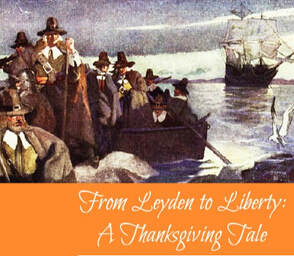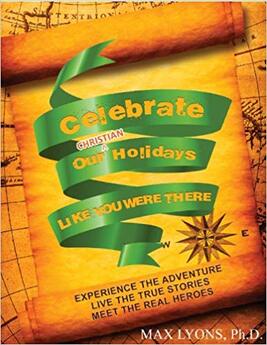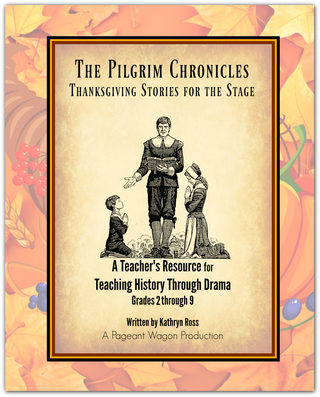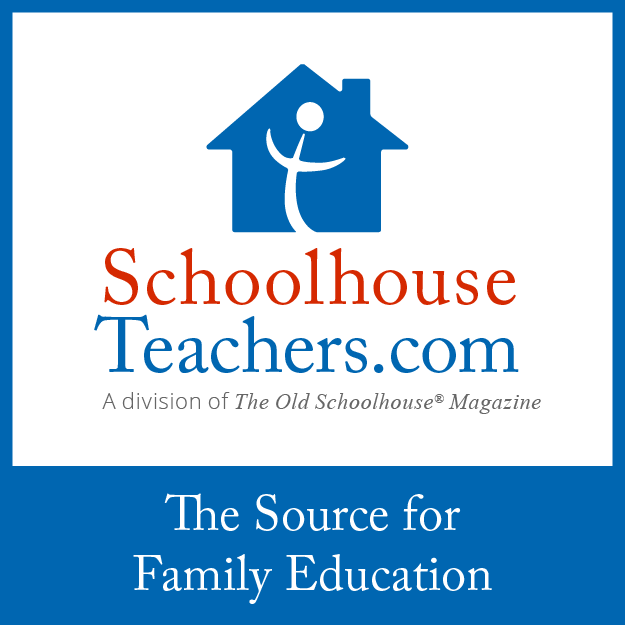 Read along or just click below and listen to "From Leyden to Liberty: The Thanksgiving Tale," originally published as Episode 3 on The Writer's Reverie Podcast on The Writer's Reverie Blog (no longer available online), and simultaneously in RUBY Magazine in November 2015 (no longer available online). Running time is approximately 26 minutes. Brew some tea, cut a slice of pumpkin pie, and stop--for a true story from our American Christian History--His Story.  In everything give thanks, for this is the will of God in Christ Jesus concerning you! 1 Thessalonians 5:18 In his book, Celebrate Our Christian Holidays Like You Were There, Dr. Max Lyons, shares concise details from primary source documents outlining specific holidays celebrated in our nation—why we celebrate them and the importance of passing these Holy Days of remembrance onto our children, and our children’s children. From generation to generation. In so doing, we teach and learn from whence we came—this gives us our national identity. When you know where you came from, you know who you are—and that gives you firm direction for where you ought to be going in the future. In the preface to this excellent resource for the American family, schools, churches, and the patriotic community at large, he notes: “A holiday is literally a Holy Day, a day to be set apart to remember God and His works on behalf of His people . . . As Americans, we also have holidays that commemorate God’s work in the life of our nation. These are excellent opportunities to present to our children, as well as to adults, stories of how God has intervened in the life of our nation. Parents and teachers will first need to learn the biblical aspects of these holidays before they can effectively pass their true meaning on to their children.” What follows in the book is a short overview of the Providential view of history in America in part 1, with a series of skits, plays, and monologues for teaching purposes in part 2. I am happy to recommend Dr. Lyons’ excellent resource book about American holidays to you, having studied under his mentoring some 20 years ago when I was first introduced to a biblical understanding of our nation’s history, which has been a part of my personal reflections, writing, and teaching life ever since. For instance, the shock of reading eyewitness accounts of the Thanksgiving story in the actual words of the pilgrim men and women who lived it—and that of the Native American Indians who greeted them on their arrival in the New World—made me both angry and elated. I was NOT taught these full truths in school. Thanksgiving, for me, had been reduced to construction paper pilgrim hats and turkey art, overstuffed meals, and football. The reality of that day, and its import to the people we should be today, and where we ought to be setting our future direction for tomorrow—as individuals and a nation—are sadly swallowed up in a distorted, politically correct, faux holiday that has become more about preparing for the biggest shopping day of the year on BlackFriday, just hours after the big family feast. Perhaps, I digress. But, perhaps . . . not. For many years I had the privilege of studying closely, then, writing, directing, and producing scores of students in Christian and home school venues, in the retelling of the actual events of the Plimoth Plantation Thanksgiving of 1621. CHECK OUT MY COMPLETE GUIDE TO PLIMOTH PLANTATION DAY DRAMAS AND ACTIVITIES IN THE PWP BOOKSHOP! Though, settlers in Virginia had already set aside a day to give thanks in 1619, it is the dramatic tale of the pilgrims who sailed the Mayflower from Plimoth, England to Massachusetts, to establish a colony there, that we look back upon.
Though many have told the tale, it has been watered down—if not completely distorted—for various agendas through the years. However, documented, primary source writings from the men and women who lived the story remain, with the truth to be told from the perspective of the author’s original intentions. I refer to the famous Thanksgiving story account by William Bradford, the first governor of Plimoth Plantation, titled, The History of Plimoth Plantation. This would not be the last official, national recognition of God’s Providential hand in the affairs of this country. Did you know that the 1st Continental Congress, in November of 1777 issued a proclamation to set apart Thursday, December 18th of that year for solemn thanksgiving and praise, stating: "That with one heart and one voice the good people may express the grateful feelings of their hearts, and consecrate themselves to the service of their Divine Benefactor . . . with their sincere acknowledgements and offerings . . . the penitent confession of their manifold sins . . . and their humble and earnest supplication that it may please God, through the merits of Jesus Christ, mercifully to forgive and blot them out of remembrance . . . to afford His blessings on the governments of these states respectively, and prosper the public council of the whole; to secure for these United States, the greatest of all human blessings, independence and peace . . . to prosper the trade and manufactures of the people, and the labour of the husbandman, that our land yield its increase, to take schools and seminaries of education, so necessary for cultivating the principles of true liberty, virtue and piety, under His nurturing hand, and to prosper the means of religion for the promotion and enlargement of that kingdom which consisteth in righteousness, peace, and joy in the Holy Ghost." Yes. These words were penned—just one year into the War of Independence—by the same men who penned the Declaration of Independence one year earlier and the Constitution of the United States a decade later. On the occasion of the final adoption of the Constitution in 1789, George Washington proclaimed yet another official day of Thanksgiving, as requested by both Houses of Congress stating: "It is the duty of all nations to acknowledge the providence of Almighty God, to obey His will, to be grateful for His benefits, and humbly implore His protection and favor." But, it was a woman named Sarah Hale—the trendsetter of the 19th century American woman through her prolific editorial pen in ladies’ periodicals of the day—who led a 15 year letter writing campaign with women across the nation petitioning for a national Thanksgiving Day. Sarah and her legions of petitioners succeeded when, at the height of America’s Civil War, Abraham Lincoln issued his Thanksgiving Proclamation on October 3, 1863, including these words of note: "No human counsel hath devised, nor hath any mortal hand worked out these great things. They are the gracious gifts of the most high God, who, while dealing with us in anger for our sins, hath nevertheless remembered mercy . . . I do therefore, invite my fellow citizens in every part of the United States, and those who are sojourning in foreign lands to set apart and observe the last Thursday of November next as a day of Thanksgiving and Praise to our beneficent Father who dwelleth in the heavens . . . it is announced in the Holy Scriptures and proven by all history, that those nations are blessed whose God is the Lord . . . it has seemed to me fit and proper that God should be solemnly, reverently and gratefully acknowledged, as with one heart and one voice, by the whole American people." Did you know that there are thousands of this type of proclamation with such language on record, penned by national leaders and presidents in our almost 400 year history dating back to that first Thanksgiving in 1619 Virginia? But, it is that picture of the Mayflower, pilgrim men and women, and Native American Indians—who actually ate more seafood and venison throughout their three day Thanksgiving feast than turkey and stuffing—it is they, who capture our imaginations. They had much to be thankful for in that day. And much to mourn. In truth, they passed a traumatic twelve months from their arrival in the fall of 1620 to their Thanksgiving feast of 1621. By 1623, as life on Plimoth Plantation stabilized, our plucky forefathers wrote a poem they’d sing to a popular tune of the day. The words remain with us as yet another first-hand account of an epic moment of American history. The Pilgrims’ story begins in 1607 when Christians in England met secretly to worship God according to the way the Bible taught rather than the way King James and his state appointed bishops had mandated that they should. These brave people were called “separatists” because they had recently “separated” from the Church of England. They realized that the Bible taught the freedom in Jesus Christ to know right from wrong and to be self-governed by their hearts submitted to God, rather than mere traditions of men. Religious persecution became so great, the worshipers were forced to flee England for Holland. William Bradford records the details in his famous diary writings: "Thus, being constrained to leave their native soil and country, their lands and livings, and all their friends and familiar acquaintances, it was...thought marvelous by many to go into a country they knew not... where they must learn a new language and get their livings they knew not how. It was by many thought an adventure almost desperate, a case intolerable, and a misery worse than death. They were not acquainted with the trades and traffic, but those things did not dismay them for their desires were set on the ways of God to enjoy His Providence and they knew Whom they believed." The pilgrims lived in Leyden, Holland for about ten years in relative peace. But all was not well. Leyden was a beautiful place of wealth . . . and worldliness. They were free to worship God, but it was easy living that made it easy to lose the sense of God’s will. Their children were growing up with no memories of England and were greatly influenced by the worldliness of the Dutch children. But through a miraculous set of circumstances, King James—who had persecuted them a decade before causing them to flee—actually granted them a charter to establish a colony in Virginia, in the New World. The Pilgrims returned to Plimoth, England to set sail for the American shores. The ocean voyage was treacherous. A storm knocked them off course, bringing them to the Massachusetts shoreline near Cape Cod. It was too late in the year to try to sail south to Virginia. The small party of pilgrims decided to settle where they were. They drafted the very first constitutional document of our nation titled the Mayflower Compact, which set forth in writing their agreed purposes in coming to the shores of America, and commitment to each other and God as a governmental body. It was just about winter. They made settlement in a prepared clearing where Indians once lived, but had died out four years earlier of disease. There was only enough time to build one common shelter before the cold of winter set in. It was a small beginning – but they believed God was on their side. We live in New Plimoth, a wilderness wood. Where grass is much wanting that’s fruitful and good Our mountains and hills and our valleys below Being commonly covered with ice and with snow. Yet we still praise Jehovah for our God is good! And when the northwester with violence blows Then everyman pulls his cap over his nose; But if any’s so hardy and will it withstand, He forfeits a finger, a foot, or a hand. Yet we still praise Jehovah for our God is good! In January and February of 1621, with only six people well enough to care for all who had become sick, they bid farewell to many husbands, wives, mothers, fathers, and children who died. Their small fellowship, became smaller. Of 18 married women, only 5 survived. Of 29 unmarried men, servants, and hired hands, only ten survived. Bravely, they pressed on. Yet we still praise Jehovah for our God is good! By March, winter was leaving and spring was in the air. Six new cabin homes had been built. The General Sickness was gone, and new challenges were before them. Farming the new land! With only five kernels of corn each to plant, Governor Bradford said, “Five kernels of corn! Five kernels of corn! Ye people be glad of five kernels of corn!” A very small beginning indeed. As was their habit, they prayed to God to help farm a land they did not know. The Lord sent two Indians into their midst who had met Englishmen before and knew the English language. They also, knew God, having converted to Christianity some years earlier. They helped the pilgrims make friends with the surrounding Indian tribes. Trade was established and the goods they needed were provided. The Indians taught them how to farm new foods like corn and squash and pumpkin. These Indians, Samoset and Squanto, taught them how to make the most of their five kernels of corn. With God’s blessing, their small seeds began to grow – but not without much work on their part. When spring comes to Plimoth, we then take the hoe And make the ground ready to plant and to sow; Our corn being planted and seed being sown, The worms destroy much before it is grown. Yet we still praise Jehovah for our God is good! And when it is growing some spoil there is made By birds and by squirrels that pluck up the blade E’en when it is grown to full corn in the ear, It is often destroyed by raccoon and by deer. Yet we still praise Jehovah for our God is good! Yes, there was much they had to learn and guard against in the new land. But, God was ever faithful to provide for them, wisdom and skill, to do what was necessary. Their clothing wore out quickly because of the hard work. They waited for shipments of new clothes and shoes from England to replace them. Even so, daily life for the ladies involved keeping clothing made and mended. They started with wool from sheep, spun into yarn, woven into fabric, sewn into clothes – and clouts! What’s a clout? All pilgrim garments had clouts. Patches!!! Now here in New Plimoth our garments grow thin And wool is much wanted to card and to spin; If we get a garment to cover without Our other in-garments are clout upon clout. Yet we still praise Jehovah for our God is good! Our clothes we brought with us are often much torn They need to be clouted before they are worn But clouting our garments they hinder us nothing Clouts double are warmer than single whole clothing. Yet we still praise Jehovah for our God is good! In the Fall of 1621, just one year after their arrival, God had blessed their small beginnings with a plentiful harvest. They were so very thankful for all God had done for them in their new land and decided to hold a great Thanksgiving feast. Of course, they would invite the Indians and their great chief Massasoit, who brought 90 of his braves and much deer meat, and birds to roast. There was enough for all. Especially when the women baked up dishes and dishes of vegetables and Pumpkin Surprise! If flesh meat be wanting to fill up our dish We have carrots and pumpkins and turnips and fish And when we’ve a mind for a delicate dish We repair to the clam-bank and there we catch fish. Yet we still praise Jehovah for our God is good! Instead of pottage and puddings and custards and pies Our pumpkins and parsnips are common supplies We have pumpkin at morning and pumpkin at noon If it was not for pumpkin we should be undoon. Yet we still praise Jehovah for our God is good! For three days they feasted and gave thanks in prayer! They enjoyed contests and games with the Indians. But, being able to worship in total freedom was the greatest blessing of all. No matter how small their beginning had been, no matter the greatness of their losses, no matter trauma of their trials and suffering . . . We praise Jehovah for our God is good! The verses of this ballad about life in New Plimoth was a joyful song sung through the years, handed down from generation to generation. And, in 1767 – someone finally wrote it down on paper, from the lips of a 94 year old woman who had learned it as a child from her grandparents. The song was meant to be heard back in old England where the pilgrims were honest, telling folks back home about how hard it was settling in the New World. But, just the same, they wanted to encourage new settlers to join them, trusting God in all things. Now you whom the Lord intends hither to bring Forsake not the honey for fear of the sting, But bring forth a quiet and contented mind And all needful blessings you surely will find. And, I’ll still praise Jehovah for my God is good. Be anxious for nothing, but in everything by prayer and supplication with thanksgiving let your requests be made know to God, and the peace of God, which passes all understanding will guard your hearts and minds in Christ Jesus. Philippians 4:6 Happy Thanksgiving.
2 Comments
10/12/2021 03:32:01
What an exquisite article! Your post is very helpful right now. Thank you for sharing this informative one.If you are looking for coupon codes and deals just visit coupon plus deals dot com
Reply
1/28/2022 04:43:50
Thanks a lot! Continue to post!
Reply
Leave a Reply. |
NOTE:
This Blog is UNDER CONSTRUCTION. I have YEARS of powerful content for Christian writers and homeschool families, lovers of God's Word, History--His Story, literature, and learning, to import from my old websites. 2023 will be the year I fill these blog stacks with some of my best work! Kathryn RossI'm a writer, speaker, and dramatist who loves treasure hunts in thrift stores, antique shops, vintage books, and God's Word ~ not necessarily in that order! 
Click here to read my
GUEST BLOG POSTS exploring the history of Women Writers and more at ALMOST AN AUTHOR Click the image above to learn more about the TUTTLE TWINS books teaching American
government and free enterprise biblical principles. Archives
March 2021
Categories
All
|




 RSS Feed
RSS Feed
